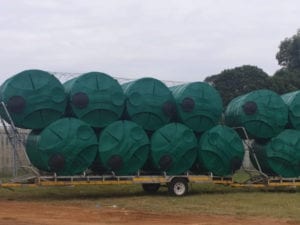In an effort to curb the spread of the COVID-19 the Department of Water and Sanitation (DWS) has commenced with the distribution of water tanks to municipalities across SA.
National Spokesperson of DWS Sputnik Ratau stated that the Department of Water and Sanitation as custodian of water resources and sanitation, has an obligation to ensure sustainable water supply to communities in particular the heavily-dense informal settlements. The distribution of water tanks is a short term relief measure to minimise the spread of the infection with special emphasis to those hotspot areas that did not have running water. The distribution of the water tanks will further alleviate the plight of rural communities who walk long distances to fetch water.Western Cape: DWS commenced with the delivery of 537 water tanks
In the Western Cape, which has recorded the second largest number of infections in the country, the department has commenced with the delivery of 537 water tanks to the district municipalities and Metro across the Western Cape. Sputnik says to date 55 water tanks have been distributed to the municipalities of the Western Cape. A total of 40 tanks were delivered in Central Karoo and 15 were delivered in Cape Winelands. Other areas such as Cape Metropole, Cape Winelands, Garden Route, Overberg and West Coast are next on the line to benefit from the roll out.Gauteng recieves 852 water tanks and 20 tankers
DWS in Gauteng has stepped up efforts to relieve water shortages by delivering 852 water tanks and 20 tankers to water-stressed communitiesthat have the least capacity to avert the rapid spread of the coronavirus. The Department is working collaboratively with Rand Water and municipalities to provide water to desperate communities in the most densely populated informal settlements. Various areas in the province, including Roodepoort, Soweto, and Ennerdale in the City of Johannesburg, Hammanskraal in the City of Tshwane, benefitted from the effort. Other area that benefitted include municipalities in the West Rand District Municipality, as well as Benoni in the City of Ekurhuleni.
- Roodepoort received 100 water tanks with a capacity of 2500 litres while Soweto got 194×2500 litres and 16×5000 litres capacity tanks.
- Hammanskraal got assistance with 57 water tanks of which 37 have a capacity of 2500 litres and the rest have a capacity of 5000 litres. Additional to this, 9 water tankers were also delivered.
- In Benoni, 70 water tanks with a capacity of 2500 litres and 4 water tankers were delivered.
- The West Rand District Municipality also got a shot in the arm in the form of 126×5000 litres water tanks together with 3 water tankers.
- The Lesedi Local Municipality got 34×2500 litres water tanks and 2 water tankers. The Midvaal Local Municipality was the recipient of 34×2500 litres of water tanks with 2 water tankers.
- A total 95 water tanks were delivered in Merafong Local Municipality (40×10000 litres,17×2500 litres and 38x 5000 litres)
- In Mogale City, 33 water tankers (10×10000 and 23×5000 litres) were delivered.
Eastern Cape receives 3355 water tanks and 168 tankers
In response to a call made Lindiwe Sisulu to ensure that all homes have access to water, as means to fight the spread of Coronavirus, the department, through the Amatola Water Board, delivered 3355 water tanksand 168 tankers (trucks) in all districts and metros around the Eastern Cape to date.
Tanks have been delivered to Buffalo City Metro (209), Nelson Mandela metro (108), Alfred Nzo District Municipality (415), Amathole District Municipality (492), Chris District Municipality (575), Joe Gqabi (76), OR Tambo District Municipality (670) and Sarah Bartmaan (810).
While some tanks have been installed and already in use, a huge number of them are in the process of installation. While they are awaiting installation, the department has instructed that all tankers be used to either service tanks that have already been stationed around municipalities or to provide water directly from the tankers at strategic points. The Eastern Cape had been declared a drought disaster province and these COVID-19 interventions come at the tale of previous drought interventions that have been spearheaded by the department. Thus, these tanks and tankers will also act as remedial efforts to tackle the ongoing drought in the province. Amatola Water Board has established a war room in East London, where the Department of Water and Sanitation (DWS) led by Deputy Minister Pam Tshwete, Department of Cooperative Governance and Traditional Affairs (COGTA), Office of the Premier and Amatola Water Board meet daily to ensure that the directive from Minister Sisulu is implemented withprecision.
Trucks and tanks dispensed in Free State
31 water trucks have been dispersed to Vrede, Fauresburg, Harrismith, Senekal, Clocolan, Petrusteyn, Cornelia, Villiers, Kroonstad, Viljoenskroon, Welkom, Bloemfontein, Thabanchu and Sasolburg. 612 water tanks have also been dispersed within the same areas. DWS has established an operations centre where daily meetings take place with municipalities and water boards utilizing internet-based conferencing facilities. Progress reports on water services are then reported on a national platform that includes Ministers and MEC’s.Limpopo receives 262 water tanks and 27 water tankers
A total of 262 water storage tanks have been delivered in four districts in Limpopo. The tanks were delivered to Vhembe (132), Sekhukhune (80), Capricon (25) and Polokwane (25) Districts. To supplement these water tanks, the Department of Water and Sanitation has also delivered 27 water tankers (trucks) to remote communities through its entity, Lepelle Northern Water. The tankers were delivered to Vhembe, Sekhukhune, Bela-Bela, Polokwane, Moponi, Polokwane, Lephalale, Mogalakwena, Thabazimbi and Mokgopong/Modimolle. Ratau says DWS pleads to the communities to safeguard the water infrastructure during installation and beyond. Meanwhile DWS encourages communities to wash hands with soap as a way to curb the spread of COVID-19. “All water users are reminded that South Africa remains a water scarce country, therefore, extra care should be exercised when water is being utilised to avoid water wastage that could leave us waster distressed.”






